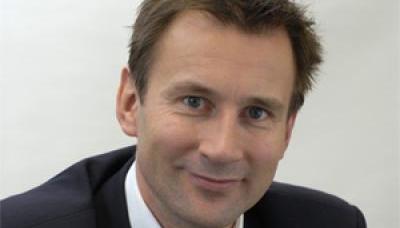Culture Secretary Jeremy Hunt today announced that the Government’s plan to roll out 2Mbps broadband to all British homes by 2012 have been delayed – till 2015.
Hunt blamed the previous government for setting a target that could not be met with the resources available, at a broadband business summit in London, acording to reports in the Financial Times and elsewhere: “I’ve looked at the provision that the previous government made to achieve this by 2012 and, as I’m afraid with many schemes they announced, I’m not convinced that they put sufficient funding in place.”
Hunt helped create the shortfall
 Ironically Hunt helped contribute to the funding shortfall, having opposed a Labour plan to raise funds with a levy of 50p per month on every phone line, and forced the Labour government to abandon the plan before the General Election.
Ironically Hunt helped contribute to the funding shortfall, having opposed a Labour plan to raise funds with a levy of 50p per month on every phone line, and forced the Labour government to abandon the plan before the General Election.
Instead, Hunt has announced plans to use around £300 million of BBC licence fee money originally earmarked for the switchover to ditgital TV to help fund broadband rollout. This sum is less than the £2 billion which BT believes is necessary to do the job.
The coalition government had previously promised to give everyone in Britain at least 2Mbps by 2012. Hunt repeated a separate promise, to provide the best superfast broadband network in Europe by the end of this Parliament, implying that both goals are now set for 2015, at the end of this parliament.
A body called Broadband Delivery UK, is managing the goals, and ran today’s Industry Day summit at the Department for Business Industry and Skills (BIS).
About three million households (mostly in rural areas) still cannot get 2Mbps, and around one percent of the country (160,000 UK homes) cannot get broadband over phone lines at all, while fibre-based superfast broadband will miss about a third of the country under current plans by commercial providers.
Commercial operators plan to compete for the economically viable sectors of the country, instead of running fibre where people cannot afford it, but Hunt called for them to co-operate and share their networks saying: “There is currently nothing to stop telecoms or utility companies reaching commercial agreements to share their infrastructure, but very few agreements currently exist.”
BT, which is spending £2.5 billion on its own networks to get fibre to two-thirds of the population by 2015, has expressed doubts that there are any new ways to collaborate. BT’s group director of strategy, Olivia Garfield, told the Daily Telegraph: “I can’t conceive any commercial construct where that 67 percent will get any higher”.
Hunt promised that networks would be “future proof” and suggested that water companies should lay empty pipes for fibre every time they dig up the roads.





